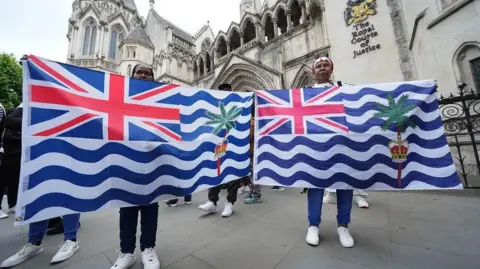In recent political discussions surrounding the United Kingdom’s £3.4 billion deal to transfer sovereignty over the Chagos Islands to Mauritius, a heated exchange occurred between leaders of the Conservative Party and the Labour Party. Sir Keir Starmer, representing Labour, defended the arrangement, stressing its importance for maintaining UK strategic interests via the military base located on Diego Garcia, which is integral to British and allied military operations. Meanwhile, Conservative leader Kemi Badenoch was quick to criticize the deal, labeling it as detrimental and questioning the rationale behind UK taxpayers financing tax cuts in Mauritius.
The crux of the contention lies not only in the fiscal implications of the deal but also its broader geopolitical ramifications. At the core of the debate, Badenoch asserted that funding tax cuts in Mauritius is unacceptable when the British taxpayer is involved. Her concerns were echoed by some factions within the public and political realms who feel undue burden should not fall on UK citizens, especially when the financial aid aims to benefit a foreign economy. Badenoch defensively argued that the arrangement was not linked to national security interests, posing the question as to why the UK should be responsible for another nation’s debt relief.
In a recent statement, the Mauritian Prime Minister, Navin Ramgoolam, outlined that the funds from the Chagos deal will be allocated toward alleviating the country’s public sector debt, allowing for extensive income tax exemptions for a significant portion of the Mauritian workforce. Specifically, he indicated that 80 percent of the island’s workers would, under the new budget, be exempt from income taxes, which notably raises the stakes regarding the funds’ utilization. This developmental angle is a significant point of home interest for Mauritius, which has been led to believe that such funding may foster local economic growth.
Defending the strategic necessity of the arrangement, Sir Keir Starmer articulated that failing to proceed with the deal could compromise the UK’s security. Arguing that “no responsible prime minister would let that happen,” he elaborated on the critical role that the Diego Garcia base plays within the framework of international military collaboration, particularly with allies such as the United States and India. Starmer pointed out that while the deal was unfavorable to the UK’s adversaries like Russia and China, it was strategically beneficial for allied countries.
In addition to the immediate financial and strategic implications, the deal’s ongoing negotiations have inherited historical grievances from the Chagossian people, who were forcibly removed from their homes in the 1960s and 1970s. A panel appointed by the United Nations Human Rights Council has recently urged the UK to revisit and renegotiate the deal, citing the lack of adequate representation and rights afforded to the Chagossians in the discussion processes leading up to this arrangement. This sentiment reflects long-standing debates concerning the rights of forcibly displaced communities and their retrospective claims to autonomy and representation.
The complexities surrounding the Chagos negotiations have further convoluted with former Prime Minister Liz Truss’s involvement, who initiated talks during her brief leadership tenure. However, divisions persist regarding how much influence her administration truly had, with subsequent leaders attributing the momentum to previous governments.
As the political discourse continues, both the Labour and Conservative parties grapple with distinct narratives about self-determination, international obligations, and economic impacts. With the potential ramifications on both UK foreign policy and Mauritian domestic affairs at stake, the Chagos Islands deal escalates beyond mere political posturing, as it integrates historical grievances, national interests, and fiscal accountability into a multifaceted discussion on sovereignty and governance.



